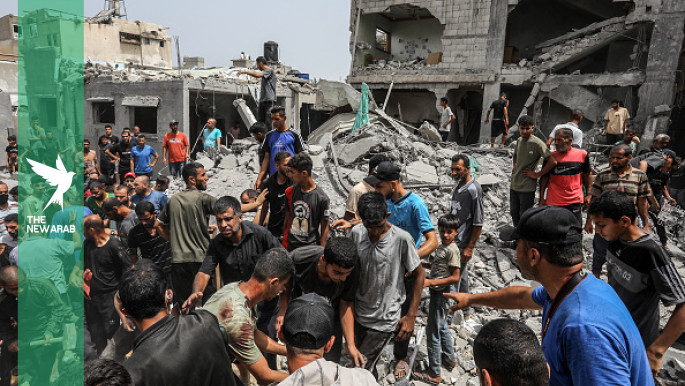Israel’s military has admitted to killing Palestinians seeking aid at distribution points in Gaza run by a US-Israeli-owned Gaza Humanitarian Foundation (GHF), as NGOs called for the current deadly aid distribution system to be shut down.
Senior Israeli officers from the army’s southern command confessed on Monday that some operations had involved “uncalculated and inaccurate” fire, resulting in civilian casualties.
In one such incident, between 30 and 40 Palestinians were killed or wounded near an aid site. The army claims it has since changed its tactics and issued new guidance to “avoid” harming civilians, though it did not say when the changes were made or what they involved.
Calls for GHF to be closed
Palestinian authorities and aid groups have confirmed that over 500 Palestinians have been killed and almost 4,000 injured while seeking aid, since GHF began operations in late May.
More than 130 charities and NGOs signed a petition on Tuesday, saying that starving Palestinians are frequently targeted by the Israeli military while seeking aid, and calling for GHF to be disbanded.
Their joint statement accuses Israeli forces and armed groups of “routinely” opening fire on civilians seeking aid, adding: “Today, Palestinians in Gaza face an impossible choice: starve or risk being shot while trying desperately to feed their families.”
Children, including orphans and their caregivers, are among the dead, with minors harmed in more than half of the attacks.
The statement described the GHF as “a deeply flawed and dangerous alternative to established humanitarian mechanisms”. It said it “forces desperate civilians to cross active conflict zones to access aid, only to be met with live fire”.
“Today, Palestinians in Gaza face an impossible choice: starve or risk being shot,” the organisations wrote. “This is not humanitarian aid – it is a deadly trap.”
The organisations demanded a return to neutral, community-based humanitarian delivery, led by the UN and protected by international law. “The GHF must be dismantled before more lives are lost”.
Now, after repeatedly denying that civilians were being shot and killed, the military appears to have now admitted major errors in the handling of the aid stations.
An internal investigation into the matter has concluded that “lessons were learned”, while an army spokesperson added that incidents involving civilian casualties at distribution points were under review.
Despite this, Israeli forces on Tuesday killed at least 16 Palestinians seeking aid near the Netzarim Corridor. In a separate massacre in Gaza City, at least 39 Palestinians, including journalists using a cafe’s wifi, were killed.
Since launching its ground offensive in Gaza, Israel has killed nearly 600 Palestinians at or near aid sites, with over 4,000 others wounded.
The admissions come after Israeli soldiers told Haaretz last week they were ordered to open fire on Palestinians, including women and children, near food convoys.
UN and rights groups condemn aid site violence
UN officials and rights groups have strongly condemned the ongoing massacres at aid sites, warning that the current model of food distribution in Gaza was putting civilians directly in harm’s way.
The GHF, which uses private US security and logistics contractors, bypasses the UN-led humanitarian system that Israel claims Palestinian armed groups exploited.
The UN has rejected that justification, describing the GHF’s model as both unsafe and in violation of humanitarian principles.
The GHF replaced more than 400 community-based aid points used during the temporary Israel-Hamas ceasefire with just four military-controlled distribution sites.
UN agencies have repeatedly condemned the model, saying it violates humanitarian norms and forces two million people into overcrowded, militarised zones under daily threat of gunfire.
“Any operation that channels desperate civilians into militarised zones is inherently unsafe. It is killing people,” UN Secretary-General António Guterres said.
Jonathan Whittal, head of OCHA in the occupied Palestinian territories, said on Sunday that the fuel blockade and militarised aid distribution had led to a “systematic collapse of life-sustaining services”.
“Unless the total blockade on fuel entering Gaza is lifted, we will face more senseless and preventable death. These are conditions created to kill,” he warned.
The Israeli army claims over 50 million food rations have entered Gaza since October 2023, but humanitarian groups say access remains dangerously unequal.
The UN continues to document systematic attacks on civilians seeking aid. The World Health Organisation (WHO) has recorded 734 attacks on Gaza’s healthcare infrastructure since the war began.


